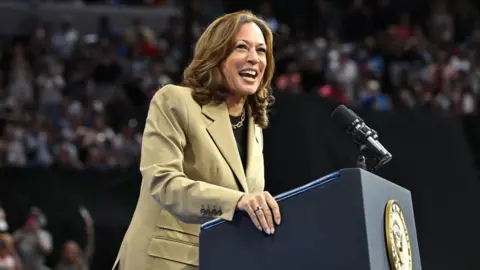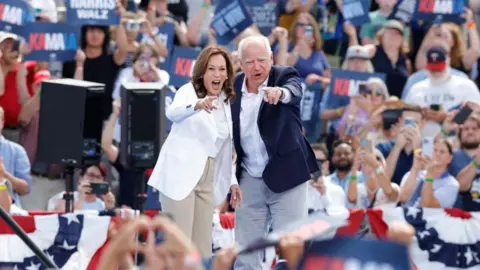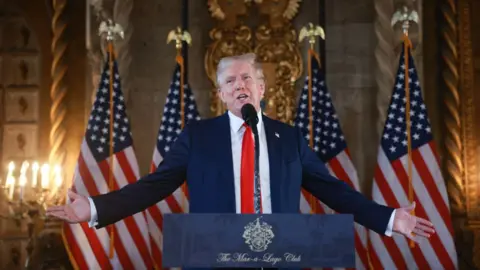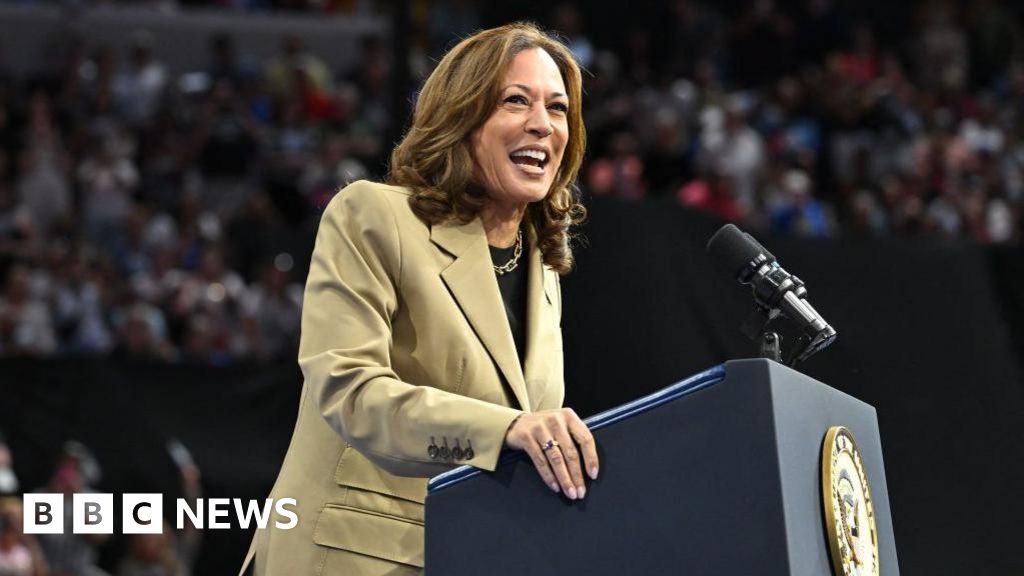 AFP
AFP“They’re weird.”
With that simple diss – as well as an overall more streamlined message – Vice-President Kamala Harris’s presidential campaign has shifted the conversation away from the weaknesses of her boss, President Joe Biden, and shone a spotlight on her opponent, Donald Trump.
The change of tone was on full display at rallies this week, where she appeared with her new vice-presidential pick, Minnesota Governor Tim Walz. With Beyonce’s Freedom as their soundtrack, the pair made the case that they were out to protect American freedoms while their “weird” Republican opponents, Trump and his running mate JD Vance, threatened to take them away.
“We’re not going back,” Ms Harris told an enthusiastic crowd in Philadelphia, leading a chorus of what has become the campaign’s de-facto slogan.
It is a stripped-back version of Mr Biden’s 2020 message – that Trump is a “threat to democracy” – that casts the former president as out of touch with American life.
Even the vice-president’s press releases, sent from a campaign that once served Mr Biden, have reflected the tone shift from deeply serious to something more light-touch.
Just five days after Mr Biden stepped aside, a Harris spokesperson quipped that a Trump speech made him sound “like someone you wouldn’t want to sit near at a restaurant”.
Campaign strategists say this new messaging appears to be cutting through with Democrat-leaning voters because it makes voting for Ms Harris sound more like a common-sense choice, and less like a civic chore. But it is too early to tell if this fresh goodwill for a vice-president who, until recently, struggled to grab the attention of American voters will last until November’s election day.
California Lieutenant Gov Eleni Kounalakis, a Democrat who considers the vice-president a close friend, said the campaign’s fresh rhetoric reflects Ms Harris’s “great sense of humour” and her ability to be “a good communicator on a very basic level”.
“The fact is, these things are proving to be her strengths, and her joyfulness is breaking through the dark, menacing undertones of Donald Trump and his running mate.”
Meanwhile, Trump, who has long been known as an effective mudslinger and energetic campaigner since he entered politics during the 2016 presidential campaign, has struggled to punch back – especially against the “weird” framing.
“They’re the weird ones. Nobody’s ever called me weird. I’m a lot of things, but weird I’m not,” Trump said last week in an interview with conservative radio host Clay Travis.
He returned to the theme at a rally on Friday in Montana, telling the crowd: “We’re very solid people. We want to have strong borders, we want to have good elections, we want low interest rates, we want to be able to buy a house.”
“I think we’re the opposite of weird, they’re weird.”
A honeymoon of free press
Ms Harris, who once trailed Trump, is now on the front foot, polls suggest.
David Polyansky, who served as deputy campaign manager for Florida’s Republican Governor Ron DeSantis’s 2024 presidential campaign, said that this shift could be because Ms Harris was beating Trump at his own game.
Since he first ran for president, Trump has benefited from being the main political story in the country, enjoying what political insiders like to call “earned media”, or free press.
But it is Ms Harris’s dramatic swing to the top of the Democratic ticket just weeks before the Democratic National Convention that has dominated headlines and airwaves in recent weeks – and she has done it without sitting down for a major media interview.
 Getty Images
Getty ImagesTo upstage the former president, who only recently faced an assassination attempt, is no small feat, said Mr Polyansky.
“It’s really pretty remarkable,” he said.
Her campaign appears further buoyed by picking Mr Walz as her running mate.
A survey conducted by the New York Times and Siena College from 5 to 9 August puts Ms Harris ahead of Trump by 50% to 46% in three key battleground states – Wisconsin, Pennsylvania and Michigan.
It comes after a recent YouGov poll, conducted on 4-6 August, which suggested she would win the popular vote, with 45% of respondents saying they would vote for her in November, compared to 43% for Trump.
That is a reversal of fortunes. A similar poll by YouGov, conducted almost three weeks ago, showed her losing by three points.
It was, in fact, Mr Walz who was the first to use the “weird” label when making media appearances last month in support of Ms Harris’s fledgling candidacy. He was quick to use it again at that Philadelphia rally with Ms Harris when speaking of their Republican opponents: “These guys are creepy and yes, just weird as hell.”
Mr Walz’s folksy ways seemed to resonate with several voters who spoke to the BBC. They said they liked the Minnesota governor because he was plainspoken.
Between drags of a cigarette, Tyler Engel – an independent Ohio voter on vacation in St Augustine, Florida – said that Mr Walz “seems like a normal guy, a family man”.
“And if there is one thing that we are starved for in this country, it’s normal people,” Mr Engel added.
Another voter, John Patterson of Chambersburg, Pennsylvania, said he found Mr Walz to be “a very genuine person”.
“What you see is what you get with him,” he added.
Is ‘weird’ working with voters?
Some political consultants marveled at the “weird” label’s effectiveness. Many said that it broke through because it felt authentic, was not an audience-tested catchphrase or cliche, and it came about “fast and organically”.
Calling Trump and JD Vance “weird” effectively repackaged President Biden’s “threat to democracy” theme in a “very understandable – almost light-hearted – way that was maybe less severe and more colloquial”, said Brian Brokaw, who worked on several of Ms Harris’ campaigns and ran a Super PAC that supported her presidential campaign in 2020.
He said the term immediately helped to recast the race from a referendum on Mr Biden’s four years in office to a question of “do we really want to go back to what we were doing during the Trump era?”
Republican pollster Frank Luntz was more sceptical.
On BBC Newsnight on Tuesday, he declared Ms Harris the new front runner, noting she had captured fresh “momentum”.
But he dismissed the “weird” label as “weird in itself”, saying it didn’t resonate with voters.
 Getty Images
Getty ImagesThe catchphrase did seem to land with several undecided voters interviewed by the BBC. Jacob Fisher, an independent voter from Atlanta, said he thought calling Trump and Mr Vance “weird” was appropriate and only mildly insulting in an age of political name-calling.
“I think it’s fair,” Mr Fisher said. “You can’t say that it’s very harsh because you have the other guy talking about how his opponents are vermin. So ‘weird’? I don’t know, but you can’t really complain if you’re Donald Trump.”
Still, voters who said they were backing Trump were unimpressed with the campaign’s recent messaging.
Frank and Theresa Walker of Illinois shared the view that the US was “going to hell” under the Biden-Harris administration, and Gem Lowery – a Trump voter in Florida – said she did not like Harris’s pick for vice-president or the “weird” label they have used when discussing Trump, Mr Vance and the Republican platform.
“I think the Democrats are the weird ones,” Lowery told the BBC. “So no, I don’t think that’s right to call Republicans ‘weird.’”
A looming election
Ms Harris’s “brat summer” will not last forever.
While the pick of Mr Walz and the upcoming Democratic National Convention will be certain to maintain Ms Harris’s media dominance, experts agree that the campaign will have to change gears soon.
Mr Brokaw, a long-time adviser to Ms Harris, said that her campaign will need to work to bottle the enthusiasm it has enjoyed since the vice-president became the Democratic nominee.
“The peak of the honeymoon period is the convention, and then it’s going to be a grind for two months probably with some debates,” Mr Brokaw said. “This is an exciting period of time, but at a certain point it’s going to come back to reality and then it’s go time.”
“If we’re still talking about Trump and Vance being weird in October, I think I’d be surprised,” he added.
David Polyansky, the Republican strategist, said the label “works well from a 60,000 foot view”, but he believed a message on the economy and immigration would ultimately sway voters in November.
“So for Trump, it’s key he doesn’t take the bait, he focuses on his message and he reminds folks of his record and the administration’s failures on both of those issues.”
Additional reporting from Mike Wendling and Rachel Looker






















Discussion about this post